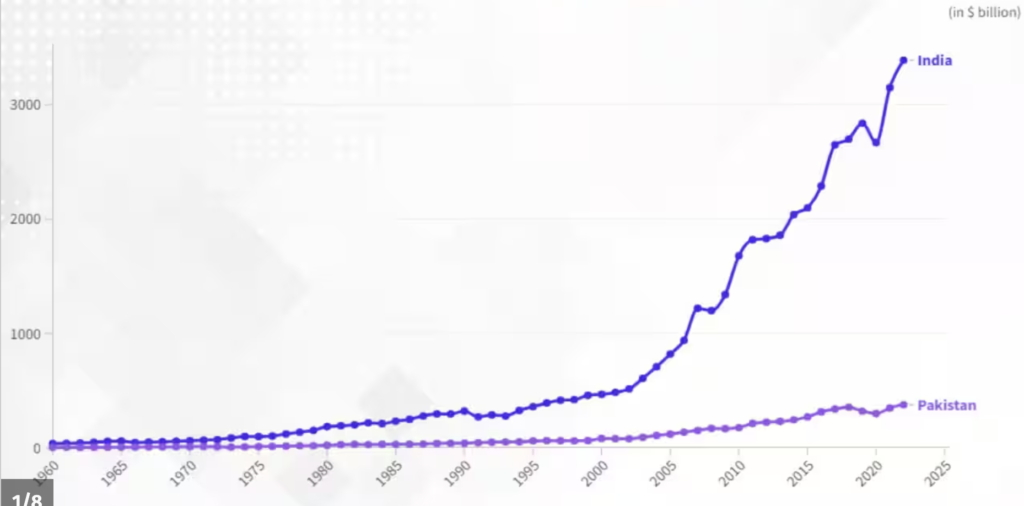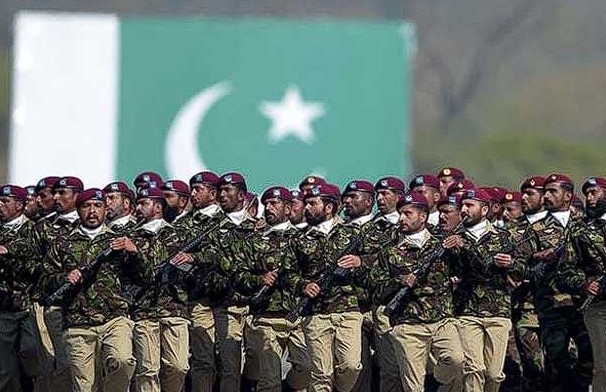According to sources, Pakistan is likely to increase its defence budget by Rs159 billion for the 2025–26 financial year, bringing the total to Rs2,281 billion. The defence budget has been increased while the Pakistani government is cutting funds for health, education, and infrastructure.
This would be a 7.5% hike compared to this year’s budget of Rs2,122 billion for 2024–25.
To put it in perspective, last year (2023–24), the defence budget was Rs1,858.8 billion. So, the government raised it by Rs263.2 billion this year — a 14.16% jump.
This steady rise shows that defence and security remain top priorities for the government and not the “POVERTY”!
The ‘P’ in Pakistan stands for Poverty
To give you a gist of Pakistan’s economic condition, or we can say ‘economic crisis’, let’s compare it with the Indian economy post 1947.

India’s GDP stood at $3.39 trillion as of 2022, more than 800 per cent greater than Pakistan’s $376.53 billion GDP. (Source: World Bank)
Poverty has slightly increased due to recent challenges like COVID-19, the 2022 floods, and inflation. Even though the economy is recovering, with 2.5% growth in FY24 and a projected 2.6% in FY25, many people are still struggling. Around 42.3% of Pakistanis are living in poverty, and that number hasn’t improved much.
In the past, poverty has been reduced thanks to more job opportunities and remittances. But issues like a weak education system, child malnutrition, and tough economic conditions have held back real progress in people’s lives. Key problems—like trade restrictions, poor agricultural productivity, and a tough business environment—still haven’t been properly addressed.
The IMF program and a new government plan called “Uraan Pakistan” are helping with reforms and stabilisation. Inflation is expected to come down for now, but there are still risks ahead, like high debt, policy uncertainty, and financial challenges.
Long-term recovery depends on serious reforms, cutting unnecessary state control, opening up trade, and improving how businesses operate.
But it seems Pakistan isn’t doing or not even in the mood for doing any of the above things.
Pakistan’s Army Top Officials Acting as Gangsters
Over the years, the Pakistani Army has quietly built a massive real estate empire, calling it a “welfare scheme” for retired officers. One of the main players is DHA—those fancy housing societies you see in big cities—which sits on prime land. Army officers often get plots at super low prices, then sell them later for big profits. Some entire townships have been created this way. A big scandal, like the DHA Valley case in Islamabad, exposed how top officials teamed up with private developers to make money off these property deals.
Retired generals in Pakistan are often gifted huge chunks of the country’s best farmland—sometimes thousands of acres. For instance, a 2022 leak from Credit Suisse showed that ex-army chief General Raheel Sharif got over 100 acres of prime land in Lahore after retiring.
The army runs like a mafia, with retired officers holding top spots in army-run businesses to keep the money flowing long after they leave service. One such example is the Soldier Foundation, which some even compare to a Fortune 500 company—mostly led by ex-generals. And it’s not just local. The 2021 Pandora Papers revealed that several top military officials also own luxury properties and big businesses in places like London and Dubai. While their children do rave parties, poor children die from hunger and lack of necessities like food, clean water, and healthcare.
Funding Bad Boys
Former Prime Minister Nawaz Sharif once hinted that Pakistan’s own establishment may have had a hand in the 2008 Mumbai attacks, which were carried out by a Pakistan-based group called Lashkar-e-Taiba. Later in 2019, PM Imran Khan admitted that around 30,000–40,000 armed militants had been operating in Pakistan and that past governments had kept this hidden, especially from the U.S.
Because of this, the U.S. has labelled Pakistan as a “terrorist safe haven,” saying that terror groups can operate freely there due to weak or even supportive governance. This concern grew even more serious when Osama bin Laden, the mastermind of the 9/11 attacks, was found and killed by U.S. forces in a compound near a major military academy in Pakistan.
Conclusion
And that’s the story of Pakistan—where power lies not just in parliament, but behind the scenes. A country where poverty grows, while the elite grow richer. Where land meant to feed the nation becomes a retirement gift. Where terrorists found shelter, and the truth was buried for years.
Former Prime Ministers have admitted it. Leaks have exposed it. And yet, the cycle continues.
This isn’t just about bad policy. It’s about priorities. It’s about who holds the reins—an elected government or an establishment that’s long blurred the line between national interest and self-interest.
Until Pakistan chooses transparency over denial, reform over control, and people over power—real change will remain a distant dream.

